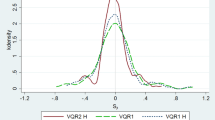Abstract
National mechanisms for comparing the research profiles of higher education institutions (HEIs) have become increasingly common. Probably the best known of these is the Research Assessment Exercise (RAE) conducted in the United Kingdom, and used as the basis for the allocation of research funding. Such exercises are expensive. They would have additional value if the data could be used by HEIs to inform the development of their research strategies. In this paper we use publicly available RAE outcome data to demonstrate this potential. We contrast the two units’ research profiles with other units of assessment within the HEI, with other like-units nationally, and finally we examine the relative performance of all the HEI’s units of assessment against their national counter-parts. Finally we discuss the kinds of insights these data may offer in the development of research strategy at the level of the institution, and at the level of the School or Department.






Similar content being viewed by others
Notes
For the purposes of allocating financial resources based on the RAE results, the government used a different weighting scheme: 7, 3, 2, 0, 0. That is, a 4* rating was weighted as 7 and both a 1* and an “Unclassified” rating were weighted 0. Any choice of weighting scheme is essentially arbitrary. That two distinct categories of quality are valued the same, however, and that the highest category is valued at more than twice the value of the second highest category would be particularly perverse in the context of an analysis of research quality divorced from resource allocation.
References
Barker, K. (2007). The UK research assessment exercise: The evolution of a national research evaluation system. Research Evaluation, 16(1), 3–12.
Chatterji, M., & Seaman, P. (2006). Research assessment exercise results and research funding in the United Kingdom: A comparative analysis. Education Economics, 14(3), 259–279.
Efron, B., & Tibshirani, R. (1994). An introduction to the bootstrap. Boca Raton: Chapman & Hall/CRC.
Higher Education Funding Council for England et al. (2004). RAE 2008 : Initial decisions by the UK funding bodies, RAE2008. Available at: http://www.rae.ac.uk/pubs/2004/01/. Accessed 22 January 2009.
Higher Education Funding Council for England et al. (2008a). RAE 2008 : News : 2008 : RAE2008 confirms UK’s dominant position in international research. Available at: http://www.rae.ac.uk/news/2008/results.asp. Accessed 23 February 2009.
Higher Education Funding Council for England et al. (2008b). RAE 2008 : Quality profiles. Available at: http://submissions.rae.ac.uk/results/. Accessed 23 February 2009.
Moed, H. (2008). UK research assessment exercises: Informed judgments on research quality or quantity? Scientometrics, 74(1), 153–161.
R Development Core Team. (2008). R: A language and environment for statistical computing. Vienna: R Foundation for Statistical Computing.
Rherrad, I. (2009). Effect of entrepreneurial behaviour on researchers’ knowledge production: Evidence from Canadian Universities. Higher Education Quarterly, 63(3), 160–176.
Scutt, D. (2004). The research assessment exercise (RAE) 2001 revisited—the University of Liverpool UoA11 experience. Radiography, 10(2), 127–130.
Selvin, S. (1998). Modern applied biostatistical methods: Using S-PluS. New York: Oxford University Press.
Siemens, L. (2009). ‘It’s a team if you use “reply all”’: An exploration of research teams in digital humanities environments. Literary and Linguistic Computing Advance Access. Available at: http://llc.oxfordjournals.org/cgi/content/full/fqp009v1. Published 13 April 2009.
Acknowledgments
Earlier drafts of this paper were prepared while DDR and PA held Professorial appointments at Brunel University; and these drafts were read and commented on by senior staff and researchers at the University. We would like to thank them for their feedback and encouragement to develop the paper for publication.
Author information
Authors and Affiliations
Corresponding author
Rights and permissions
About this article
Cite this article
Reidpath, D.D., Allotey, P. Can national research assessment exercises be used locally to inform research strategy development? The description of a methodological approach to the UK RAE 2008 results with a focus on one institution. High Educ 59, 785–797 (2010). https://doi.org/10.1007/s10734-009-9280-3
Published:
Issue Date:
DOI: https://doi.org/10.1007/s10734-009-9280-3




